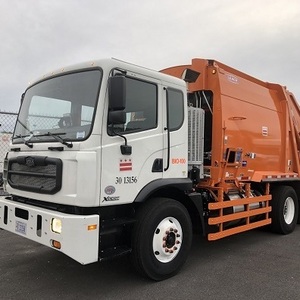DC Public Works expands B100 use with Optimus Technologies system

Photo: Optimus Technologies
June 24, 2020
BY Optimus Technologies
The D.C. Department of Public Works increased the number of heavy-duty fleet vehicles capable of running on renewable pure biodiesel (B100) by installing Optimus Technologies’ Vector System onto 17 new refuse trucks. The innovative fuel system allows the DPW to realize its sustainable energy goals immediately, as enabling the trucks to operate on B100 reduces up to 86 percent of the vehicles’ greenhouse gas emissions.
The DPW began an evaluation of the technology in 2018, when the Optimus system was installed on six garbage and recycling trucks. The Vector System allows these medium- and heavy-duty vehicles to run on pure biodiesel, a cleaner fuel solution produced from waste fats and oils. The success of the technology prompted the department to amend an existing order of 17 refuse trucks to include the Optimus biodiesel system prior to their delivery to the DPW.
Additionally, in conjunction with delivery of the new B100 vehicles, DPW installed a 12,500-gallon refueling station on-site to support the project expansion. The station is equipped with Optimus’ SMARTFuel RFID technology that limits refueling solely to vehicles that are equipped to utilize B100. The biodiesel fuel for DPW’s trucks is being supplied by North America’s largest producer of biodiesel, Renewable Energy Group.
Advertisement
Advertisement
“As the demand for emissions reduction strategies continues to grow across fleets and municipalities, we are well-positioned to provide B100 and biofuel blending options to our customers,” said Jon Scharingson, executive director of sales and marketing for REG. “As REG expands our business downstream, B100 is a cleaner fuel solution we can offer today, and the D.C. Department of Public Works is just one example of how we are doing that.”
The DPW’s switch to biofuels is one of several efforts by the city of Washington, D.C., to achieve 50 percent greenhouse gas emission reductions by 2032, with the ultimate goal being an 80 percent reduction by 2050. DPW diesel refuse trucks present the biggest barrier to these goals, as they cause the highest amount of emissions per vehicle. To address this, the department has looked to the Vector System to dramatically expand the amount of biodiesel utilized without impacting vehicle performance, operation or maintenance.
Advertisement
Advertisement
B100, however, cannot be used as fuel without some engine modifications, which is where Optimus Technologies’ expertise lies. “DPW is an avid user of lower blends of biodiesel, but to achieve its sustainability commitments, it is in need of something more,” said Colin Huwyler, CEO of Optimus Technologies. “Fleets love that they can utilize their existing vehicle specifications and just include the Optimus fuel system to achieve significant environmental and performance benefits.”
While the department has explored electric vehicles (EVs) as an alternative, Chris Geldart, DPW’s director, acknowledged that EV technology isn’t available for heavy-duty applications. The most effective solution from both a cost and technology standpoint is to operate on B100 in order to take full advantage of the fuel’s carbon reduction benefits. The success of the Optimus system has encouraged Geldart to announce that all future refuse trucks ordered by the department will operate on B100.
“We were looking for a solution to maximize emissions reductions while minimizing any effect on operations,” Geldart said. “In 2019, D.C.’s fleet of trucks consumed over 170,000 gallons of biodiesel, resulting in a carbon reduction of more than 1,598 tons. The department is driving these numbers higher through the implementation of the Optimus Vector System in more city refuse vehicles and expanding to other heavy-duty applications such as snow removal trucks.”
100 percent biodiesel allows DPW to exceed its 2050 carbon reduction target with the fleet today, despite heavy-duty vehicles presenting one of the biggest challenges to sustainability. The DPW has fully committed to this progress and intends to have close to 100 trucks upgraded with Optimus Technologies’ biodiesel fuel systems within the next year.
Related Stories
Global digital shipbuilder Incat Crowther announced on June 11 the company has been commissioned by Los Angeles operator Catalina Express to design a new low-emission, renewable diesel-powered passenger ferry.
ATR and French SAF aggregator ATOBA Energy on June 19 signed a memorandum of understanding (MOU) to explore ways to facilitate and accelerate sustainable aviation fuel (SAF) adoption for ATR operators.
Argent Fuels, a leading provider of carbon-saving fuels in the UK, is accelerating its efforts to support a greener future. The expansion of its High Blend Biodiesel will supply to bus, coach, HGV fleets and rail in the south of the UK.
Sprague Operating Resources LLC on June 24 announced it has been selected by the New York City Department of Citywide Administrative Services to supply renewable diesel for its marine fleet, including the iconic Staten Island Ferry.
On June 17, the NYC Department of Citywide Administrative Services and the Department of Transportation announced the start of the Staten Island Ferry’s transition to renewable diesel, marked by the delivery of the first barge of fuel.
Upcoming Events










